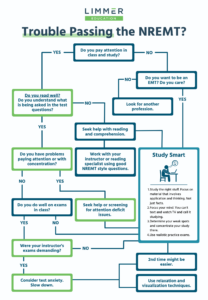By Dan Limmer
I am asked this question several times each week in emails and my weekly live online study sessions. I ask each of these frustrated candidates a series of questions. These questions require some serious introspection. The questions allow me to advise students on how to best proceed to pass the NREMT. There are three general categories:
- lack of knowledge
- learning, reading, or attention issues
- test anxiety
Lack of knowledge results from a poor class or lack of effort. Ask yourself these questions:
Did I pay attention in class and study? If you didn’t put the work into the class, you will likely fail the NREMT—even if you did OK in class. The NREMT is a challenging exam that asks you to think, apply, evaluate, and make decisions. If you mostly skated through your EMT class, you have some work to do before you try the exam again.
Was my class good? Not all classes are equal, and quite frankly, some suck. I’ve heard a lot of stories of getting out early every day, a revolving door pattern of class instructors, and an overabundance of war stories. Hint: If you didn’t study, don’t blame your class or instructor.
Solution: You have to make up for the material you didn’t learn during class. Get back into your class textbook. Limmer Education’s audio lectures can also help there. Our EMTReview.com and ParamedicReview.com sites have detailed study material to help you in the knowledge areas.
Learning issues can take motivated students and give them serious challenges. Ask yourself these questions:
Do I have trouble reading or learning? Do you find it hard to pay attention? Many questions can be asked here. Some have been diagnosed with learning or attention problems. If you’ve never been tested and you feel it takes you much more time to get work done than it does for others in class, if you have trouble reading or comprehending what you read or struggle to pay attention, you should look at these issues—especially if you’ve experienced them before in other school or work settings.
Solution: Talk to your instructor about your concerns. If you are taking your class as part of a high school or college course, learning specialists can help evaluate you and offer solutions. If you don’t have those resources available through your school, speak to your physician about testing and evaluation.
Many of the students I talk to have decided that the issue is test anxiety or poor test-taking abilities. It is essential to look at the first two situations before you jump to conclusions here. If you haven’t prepared well or have a learning issue, test anxiety would likely cause stress. The way to cure it is to address the problem—not the stress.
It is normal to have some stress before the NREMT. To determine if anxiety is causing a testing issue, ask yourself these questions:
Do you have physical signs of anxiety when taking an exam? Physical symptoms include a racing heartbeat, chest tightness, perspiration, panic, a desire to bolt from the exam room, and others. If so, test anxiety may really be the issue.
Do you know how to read and interpret an exam question? I remain amazed when I take someone through a simulated NREMT question, and they say, “Wow. I never knew you had to read them that deeply.” Many times it isn’t that you are a poor test-taker. You may not know how to take a test.
Solution #1 (if you failed once or twice): While these seem like the most serious, they can be resolved—and sometimes more quickly than for someone who didn’t pay attention for the last six months. Anxiety can be dealt with in a variety of ways: anything from breathing techniques, other cognitive or behavioral techniques, and hypnosis. If test-taking is the issue, check out Limmer Education’s YouTube channel. If you like our approach, the subscription site EMTReview.com (for EMT and paramedic) has many more ways to help conquer those test-taking issues, including live weekly study sessions.
Solution #2 (if you failed three times): Failed three times and need a good NREMT remedial course? Limmer Education’s EMT Remediation program is the most comprehensive exam preparation and remediation available. It meets the requirements of the 24 hour remediation program required by the NREMT after a third unsuccessful attempt… and will help you become a better provider. Join anytime; learn at your own pace.
Lastly, If you are finding all this is too much of a struggle or overwhelming, be sure to check in with yourself – Is EMS really for you?
Maybe you got into class with the best of intentions but learned that the field of EMS is just not for you. Or perhaps someone pushed you into taking the course. Take a step back and seriously evaluate if you really want to enter this field. If you don’t, it is OK. Look for something that will make you happy and uses your skills and talents.
All of these concepts are included in our NREMT flowchart to help you navigate reasons you haven’t been successful—and conquer them to pass the test!
Do you have experiences you want to share? Have you overcome any of these issues and want to share how? We would love to hear from you!




I studied for hours and hours after the class and each test. This was the second time doing the course and still did not pass. I was turned down by NR for accommodations and gave them documentation that i am dyslexic and they still did not give accommodations. I wasted alot of money on tudors and other classes. So what did I do wrong?